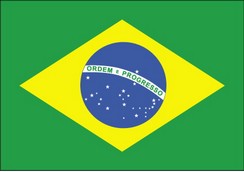 Brazil is by far the largest country in Latin America, with a land mass larger than that of the forty-eight contiguous states of the United States and a population approaching 180 million. The country boasts two of the largest cities in the hemisphere: Rio de Janeiro and Sao Paulo.
Brazil is by far the largest country in Latin America, with a land mass larger than that of the forty-eight contiguous states of the United States and a population approaching 180 million. The country boasts two of the largest cities in the hemisphere: Rio de Janeiro and Sao Paulo.
Although casino gambling is currently illegal in the country, the population participates in many forms of gambling, including illegal casino-type games. The wealthy, among a population with a wide gulf between the rich and poor, support the casinos of the surrounding countries with a great share of their patronage. They also frequent the casinos of the United States.
Casino gambling throve in Brazil in the 1930s and 1940s; however, it was prohibited by presidential order in 1946. Remnants of casino-type games remain. Machine gaming of a video variety is prevalent in the country’s many bingo halls. Sports betting and football pools are also popular, as are cockfighting, horse racing, and all forms of lottery games. A private and only quasi-legal lottery called jogo do bicho (“the animal game”) is played to support the activities of the Mardi Gras celebrations in Rio de Janeiro.
Through the 1990s and up to the present, there have been efforts to legalize casinos in some form. A casino bill was narrowly defeated in the 1991 session of the national legislative body. In 1995, a special committee was set up to study gambling and casino games. The issue remains controversial. Some organizations consider casinos to be a threat to their own financial interests. There is considerable political, economic, and cultural support, however, for the reconsideration of legalizing casinos.
The anticasino lobby is led by church forces advancing moral arguments. Pro-casino legalization arguments include the globalization of casino gaming, the reduction of trade barriers, the opening of markets, and the pressures and opportunities associated with multinational, integrated market groupings, such as MERCOSUL (the Southern Cone Common Market of Brazil, Argentina, Paraguay, and Uruguay). All the other members of MERCOSUL have legalized casino gaming, and Brazilian tourists often visit their gaming facilities, such as Punta del Este, Uruguay, and Mar del Plata, Argentina.
One perpetual major proposal for casino gaming legislation would allow luxury hotel-casinos in officially designated tourism zones. A government agency, EMBRATUR (the Brazilian Institute of Tourism), would determine the gaming zones. A Federal Gaming Commission would be established to ensure the integrity of the games.
|
|